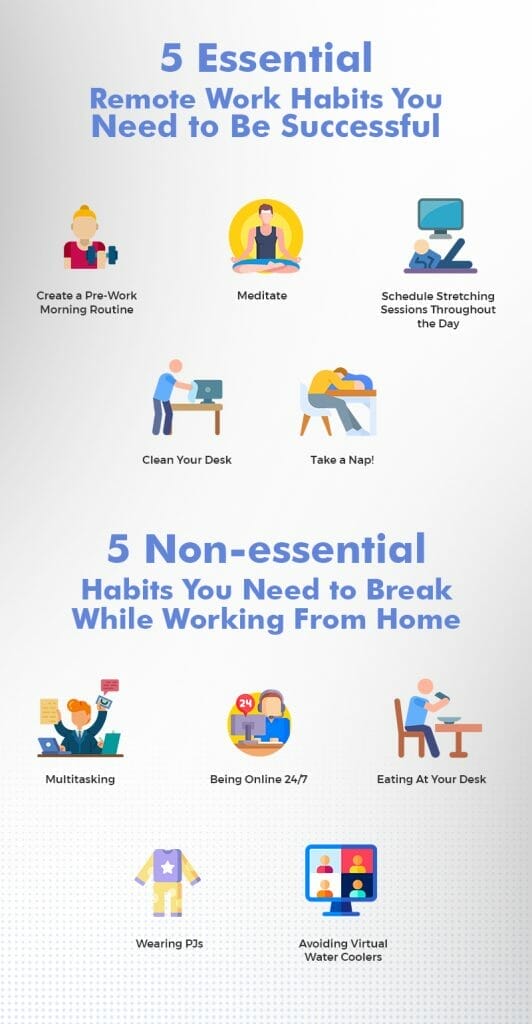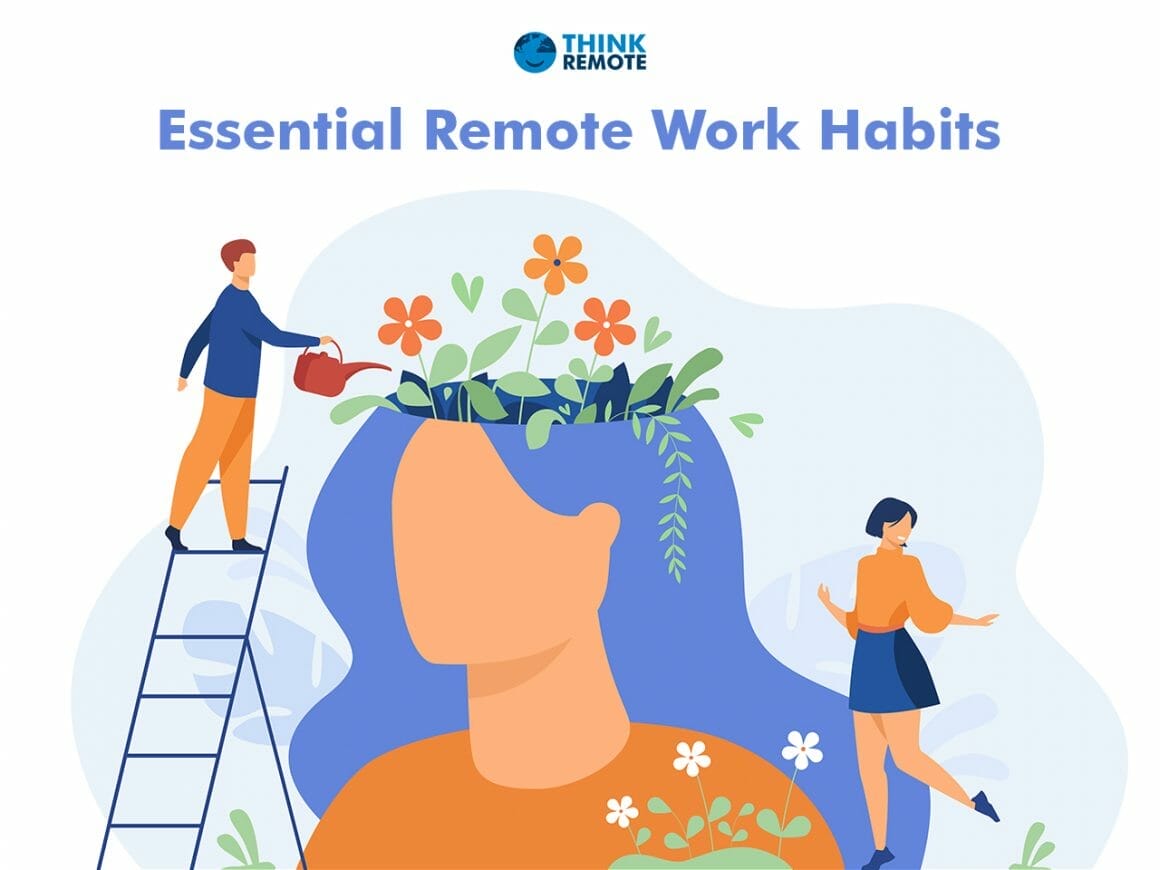Did COVID-19 force you to become a full-time remote worker? Or did you already have years of experience before the pandemic? However, your ‘’this is how I became a remote worker’’ story is, you probably struggle with certain aspects. The remote work life is not all rainbows and butterflies, it has amazing things and great benefits, but it also comes with its challenges. Working more than 8 hours, feeling disconnected from your team, and not focusing because of distractions are some of them. But it doesn’t have to be that way! With the right essential remote work habits, you can become a happy and productive remote worker.
Jump to:
Why Do You Need to Form Good Habits When Working Remotely?
When you’re working from home, it’s challenging to draw the line that separates work from life. Going to the office implies adjusting to a determined schedule, and as a remote worker sometimes (let’s be honest, most of the time) this doesn’t happen. At the office you worked from 9 am to 5 pm, and when you left you also left all the work responsibilities there. At home, it is easier to try to solve them even if that means working more than 8 hours. Going the “extra” mile instead of making you productive and more efficient makes you tired and burned out.
FlexJobs and Mental Health America (MHA) surveyed 1500 respondents that worked remotely. The results were shocking as 75% claimed to have experienced burnout to some extent, and 40% said it increased during the pandemic. 65% also reported that they tend to work more hours than in the office when working remotely.
5 Essential Remote Work Habits You Need to Be Successful
Creating to-do lists, having a designated working space, not working in bed, using time-management apps are some of the most common solutions you probably have already heard of. However, other hacks can make you a happier, healthier, and a productive remote worker. Here are 5 essential remote work habits you have probably never heard of:

1. Create a Pre-Work Morning Routine
Raise your hand if the first thing you do in the morning is check your email? Probably you get out of bed, maybe prepare some coffee, and start working right away because there are too many responsibilities, right?
Let me ask you a question, do you feel your work is more important than your life? Probably not, so what is stopping you from putting yourself first?
I know it’s hard when you have like a billion things to do, and you feel that days should have more than 24 hours. The key to being productive is to optimize your time better. It’s not about working more than 8 hours to feel you’ve done something; it’s about working the right amount of time that allows you to enjoy your life as well.
If you start working as soon as you get out of bed, it is harder to stop and say, “okay, I’ll read some pages of this book” because you already feel you have so many things to do. But if you create a pre-work morning routine that lets you start your day calmed and happy, then working won’t feel like a burden.
Here are some pre-working morning routine ideas you can implement:
- Reading a few pages of your favorite book
- Creating a healthy and delicious breakfast (and eating it at the table, not at your working desk)
- Watching TV
- Doing exercise
- Listening to music or a podcast
2. Meditate
Okay, there is a small chance you already heard of the power of meditation. For those who have never meditated before, it might be a strange and abstract concept. Probably you picture a monk or a yogi transcending and entering a state of relaxation, and think, how on earth do they do that? The perfect sitting posture, the mantras, the mudras, so many things to understand.
For remote workers or any type of employee, it can positively impact their performance at work. Studies show that meditation increases employee productivity up to 120%! That’s why companies like Nike or Apple encourage employees to implement this practice by having meditation rooms in the workplace.
The reality is that mediating is not necessarily having to implement a specific sitting posture while saying a mantra and having a specific relaxation posture. Meditating is as simple as going to your favorite spot in the house, taking a few minutes to breathe, reflecting, and being more aware of what surrounds you. Of course, if you want to know more, many platforms teach you about meditation, but for starters, it can be as simple as taking a few minutes of the day to calm your mind.
These are some great apps to help you meditate:
- Mindfulness app
- Calm
- Headspace
- Buddhify
- Simple Habit
3. Schedule Stretching Sessions Throughout the Day
There are two types of remote workers: The first one has everything they need to work comfortably: An ergonomic chair, two monitors (or even three), a great pair of headphones and a microphone, and all the necessary gear to work from home or their virtual office. Then there is the second one, which has a laptop tearing apart, headphones that barely function, and an uncomfortable chair.
Maybe you’re the first one or the second one, but in any case, the advice is the same: STRETCH! Developing a bad sitting posture while working from home is easy because you forget about standing up and taking breaks when you have many things to do. You need to send this email, finish the presentation, have meetings with the team, etc. During the first months, you might think you’re okay. But eventually, you’ll see how your back and neck hurt, and all because of not stretching and taking enough breaks.
The best way to stretch out during the day is by setting alarms; otherwise, you will probably forget. There are great apps such as Nike or Adidas that have exercises specifically for people sitting behind a desk most of the day.
4. Clean Your Desk
When it comes to essential remote work habits, this is one that you probably never thought of. We think that having many things on the desk doesn’t affect the way we work, but it certainly does. And by clean, I mean having all things in place. Your working station should be as important as any other part of the house; it’s where you spend most of your time. Don’t keep 5 different cups, water bottles, post-its, pens everywhere, a big chunk of documents, and even things that aren’t work-related. Just seeing them will make you automatically feel more stressed out.
Not that you need to clean up 24/7, but think of cleaning your desk as cleaning your mind. Take everything that doesn’t add value and add things that will make you perform better. Maybe a plant, some flowers, or a scented candle, anything that can improve your working experience.
These are some of the benefits, according to a study, that shows why having a clean desk is important:
- More likely to make healthier food choices
- Improve mental stability
- Increase productivity
- More likely to sleep better
- Improve focus
- Reduce stress
5. Take a Nap!
What? Is that even allowed?
Any remote worker that says they have never napped while working from home is probably lying (we’ve all done it, sorry boss!). People joke around saying that remote workers are lazier than onsite workers because they tend to nap every day, watch Netflix, spend 2 hours on Instagram or TikTok, among other things. However, a joke aside, is napping that bad? No! Experts say napping makes you even more productive.
According to Dr. Matthew Walker, a neuroscience professor at Berkeley, our DNA practically begs us to take a nap:
“All humans, irrespective of culture or geographical location, have a genetically hardwired dip in alertness that occurs in the midafternoon hours,”
And typically, a cup of coffee can help us fight against it, but according to The National Sleep Foundation, a nap can increase your productivity. Just to make it clear, the perfect amount of time to nap is 20 minutes max. When you sleep more than that, besides waking up and not knowing what year is it, you are even lazier than before taking it.
It’s recommended to take a power nap from 2 to 3 pm when our natural dip in energy occurs.
5 Non-essential Habits You Need to Break While Working From Home
Working from home also makes us develop habits that stress our lives even more. We tend to do them unconsciously, maybe because we are control freaks, or we don’t want to feel we are wasting time. Whatever the reason, we need to break them once and for all. Here are the top 5 non-essential habits you need to break asap:
1. Multitasking
You have 5 big tasks, so naturally, you think that trying to do most of them at once will help you finish them all. Till you realize it’s 5 pm and you have all of them incomplete. Multitasking is a silent killer. You think that it will make you more efficient and productive when it’s the other way around; it slows down the entire process.
A Stanford study found out that heavy multitaskers – those who multitask a lot and feel it makes them perform better- were worse at multitasking than those who like to do a single thing at a time. Multitaskers had a worse performance mainly because they struggled to organize their thoughts and to filter what’s important and what’s not. The general conclusion of the study is that multitasking reduces your efficiency and performance. Your brain can focus on one thing at a time, so don’t try to burn out by doing everything at once.
2. Being Online 24/7
This is a non-essential remote work habit you need to start breaking right away. Our tendency to try to control everything makes us forget we have a life outside work. And while working remotely is great because it gives us more flexibility, it is also a double-edged sword.
It’s important that we set boundaries regarding our working hours and our schedule. If your team is spread around the world, make sure to let them know what hours you’ll be online, and they can ping you and during what hours you don’t want to be bothered. While you’re on your working schedule, it’s equally relevant to have conscious work hours to focus on doing some tasks instead of answering to everyone who needs you.
Besides that, make a rule: no working past certain hours or during weekends. Obviously, this can depend on your type of work, but it’s important to make time for yourself and your loved ones.
3. Eating At Your Desk
Taking breaks is essential, especially when it comes to eating breakfast, lunch, or dinner. You spend a lot of hours working at your desk. And while you think that eating and working is saving time, it can be counterproductive. If you leave your home office for half an hour, prepare your lunch, and take time to eat with your family or roommates, chances are that when you come back to work, you’ll feel more energized.
Studies prove that taking a break for at least 15 minutes can help you increase productivity and creativity.
Just think about it, eating while working equals multitasking, not taking breaks, stretching, and many other things that make you more stressed, and make you feel your brain is shutting down, lowering your productivity levels.
4. Wearing PJs
When the pandemic started and many teams had to start working remotely, one of the things employees enjoyed the most was working with their PJs. No more uncomfortable pants, skirts, high heels, shoes, etc. However, when you embrace this as a regular thing, it can make you slow down your working pace.
It is not about working with formal clothes; you can pull off joggings, leggings, pants, and other comfortable clothes. However, make sure not to wear the same clothes you wear when sleeping.
According to Charlotte Armitage, a business psychologist at YAFTA, one of the keys to ensuring your home’s productivity levels is by creating a routine. A simple part of the routine can be changing your PJs to other types of clothes. When you do this often, psychologically, you become conditioned and associate clothes with a change of mindset. This helps you prepare better for the day ahead.
5. Avoiding Virtual Water Coolers
When you are in a regular office environment, it’s easy to socialize with your coworkers, even with people from different departments. You bump them in the elevator, in the parking lot, in the coffee bar, and many other areas that lead you to interact and have a casual conversation. In a virtual environment, this doesn’t happen, and teams need to figure out ways to build culture differently. It can be by zoom birthday parties, gaming sessions, book clubs, random zoom sessions, and many other activities.
If your team is going to celebrate a coworker’s birthday or just talk about random things by Zoom, don’t avoid them. In the beginning, it might feel weird, especially if you’re not used to working in a remote environment, but with time you will enjoy having coffee (or even a beer on Fridays) with your teammates. Remote workers’ biggest struggle is isolation, so encouraging and having these spaces will help you and your team build a stronger and healthier relationship.
Becoming a Happy Remote Worker
No one is born knowing how to work remotely. So don’t be hard on yourself; everything is a process and takes time. The key is finding out what works for you and trying to keep improving until finding the perfect work-life balance. These essential habits are perfect for implementing while working remotely, give them and try and see that you’ll feel better and happier in a matter of days.






